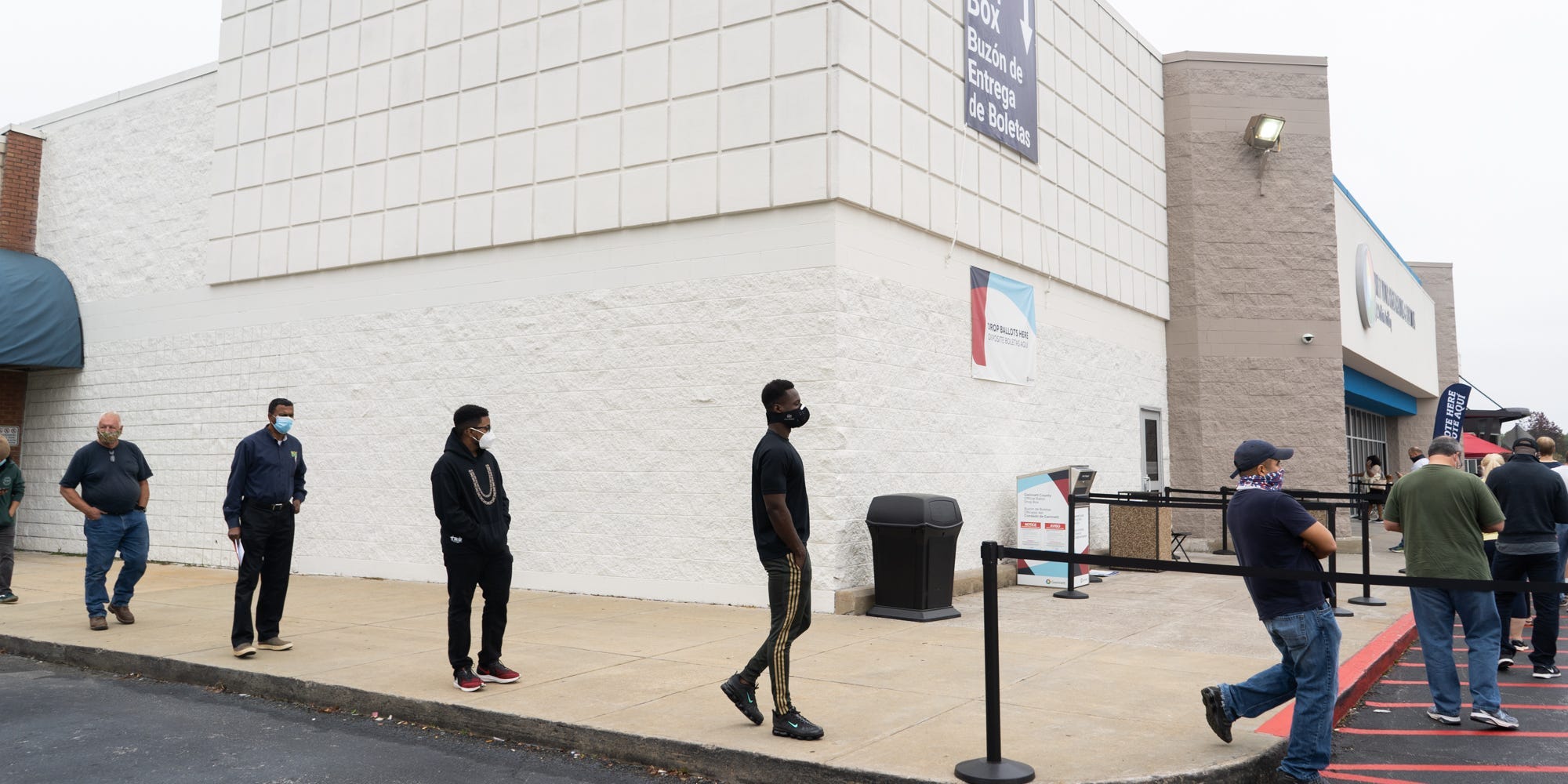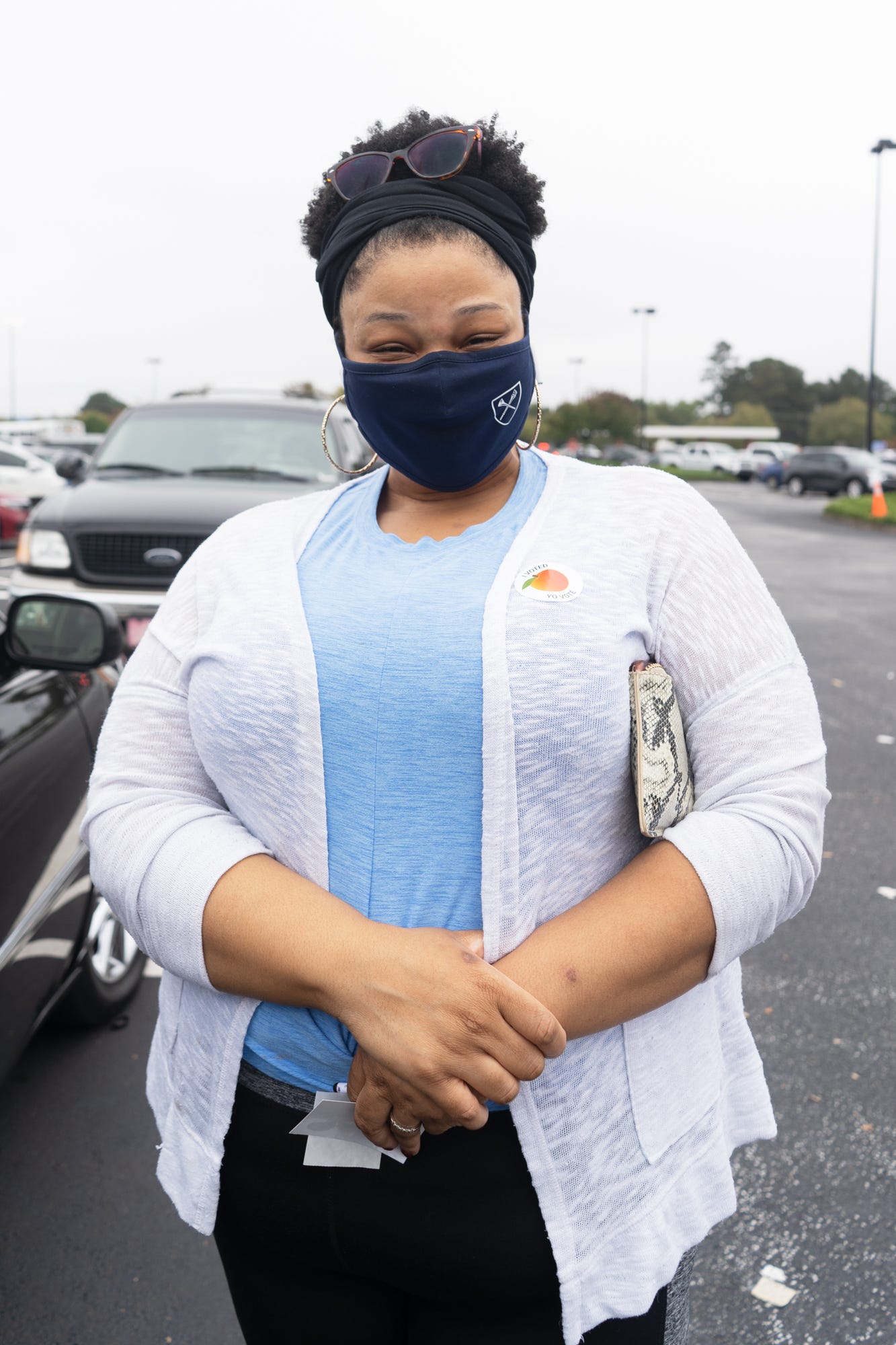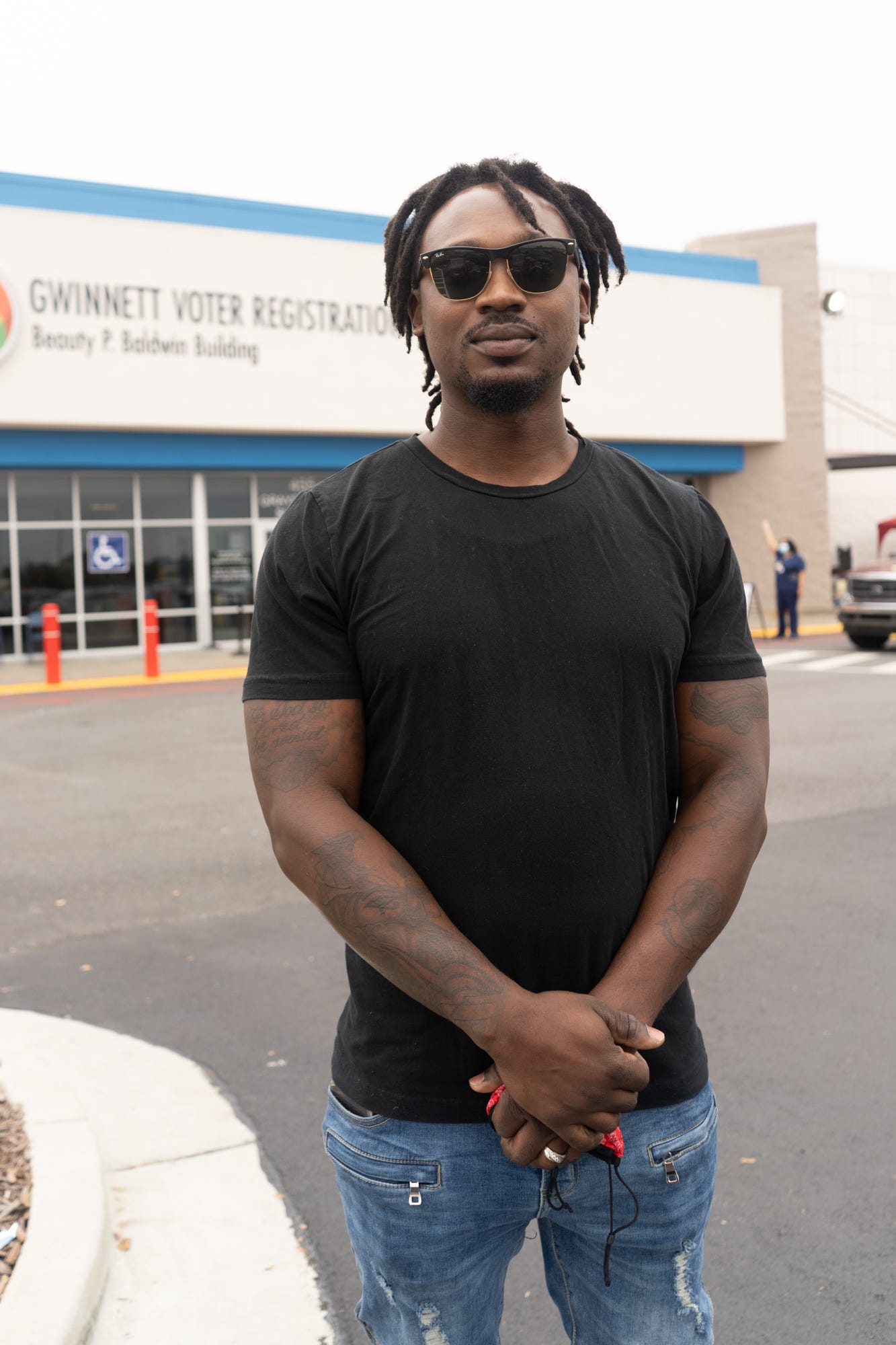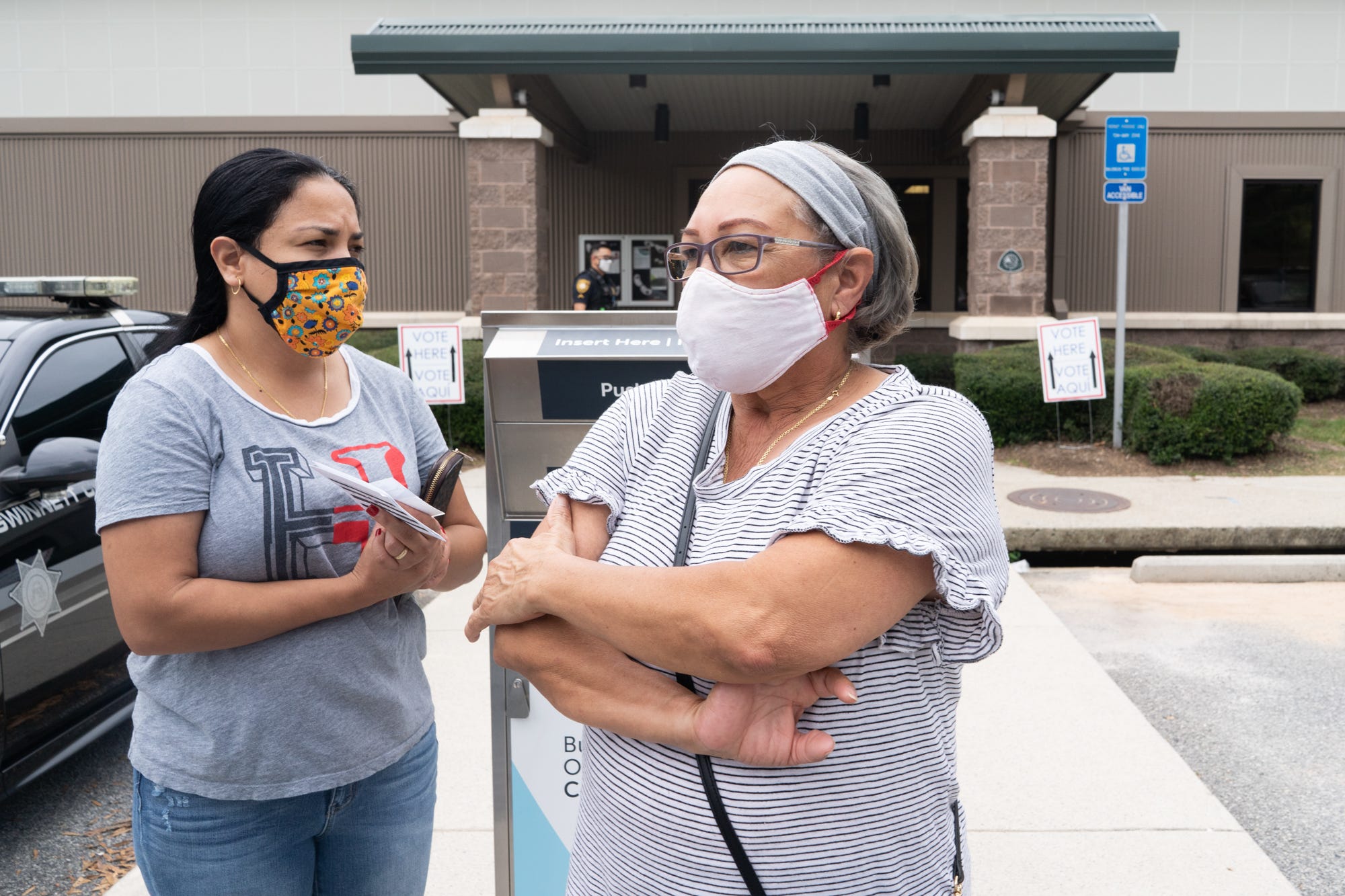
Jesse Pratt López
- As of Monday, October 26, more than 2.7 million voters statewide had cast ballots — two-thirds the total number of votes in 2016.
- But within that number, few have noticed that Gwinnett county, Georgia’s most diverse, is showing the greatest increase in early, in-person votes so far this election, when compared to the same period four years ago.
- Visit Business Insider’s homepage for more stories.
Duluth, Ga. – Nabeel and Nazley Saleheen had just finished casting their ballots at Shorty Howell Park, one of nine early voting locations scattered throughout Gwinnett County, Georgia, on Sunday afternoon.
Nabeel, who works in IT sales, moved to the bustling Atlanta metro area less than two years ago; Nazley grew up in Georgia. Both are in their 30s; neither had ever voted early in a presidential election.
“We feel more motivated [this time],” Nazley said. “We fear that something may go wrong, and we decided to vote early and in person so our candidate has overwhelming support — so it’ll be hard to say it was a fraud.”
The young couple’s votes added to a surprising and mostly overlooked part of Georgia’s booming early voting numbers, which are drawing national attention as the state is increasingly considered a swing state for the first time in decades. As of Monday, October 26, more than 2.7 million voters statewide had cast ballots — two-thirds the total number of votes in 2016. But within that number, few have noticed that Gwinnett County, Georgia’s most diverse, is showing the greatest increase in early, in-person votes so far this election, when compared to the same period four years ago.
Gwinnett’s estimated 936,250 residents make it Georgia’s second-largest county. By late last week, after 11 days of early voting, voters in the suburban area northeast of Atlanta had cast 117,488 ballots in person – a 238% increase over 2016. If you add in mail-in ballots, the number is 182,079 – a 308% increase. Among Georgia’s largest counties, only Cobb has come close, with 96,055 in-person votes during the same period, a 150% increase. Fulton, which includes most of Atlanta, has seen a 41% increase. “None of the other big counties even come close,” said Ryan Anderson, a data and marketing specialist who supplied the numbers to Business Insider and runs the website, GeorgiaVotes.com that crunches voter data from the Georgia Secretary of States’s office.
The explosion of early votes out of Gwinnett has caught some seasoned observers by surprise. "If you talked to me a year ago, I wouldn't have predicted that," said Charles S. Bullock III, political science professor at the University of Georgia and author of 30 books, including "The New Politics of the Old South."
A visit to several polling places this week showed some of the reasons people — behind this dramatic rise in turnout — give for voting early.
Asti Winters cast her ballot Monday afternoon at the Gwinnett Voter Registrations and Elections Office polling site in Lawrenceville. Winter, 39, had not voted early in previous presidential elections. "This time, because of the pandemic, a fear of being here with huge crowds on the 3rd, I decided to come early," she said.

Jesse Pratt López
Also, "it's such a super important election this year; there's lots of discussion about what could happen — violence at the polls, fraud, conspiracies. I just want to make sure we have the ability to exercise our right to vote." Her husband had already voted in person; her parents and grandmother, who's 83, had sent mail-in ballots, trying to limit their exposure to other persons due to the pandemic.
Ardtnael Debose, 35, also voted Monday in Lawrenceville. He's lived in Gwinnett since 1992, and has been voting early since former President Barack Obama's second term. "The lines aren't as bad," he said. Debose, who is Black, has talked to some of his younger cousins about the importance of voting. "For Black people especially, actually getting out to exercise the right to vote – especially young people – and since it's something our ancestors couldn't do, they had to fight for — it's so important."

Jesse Pratt López
Winters and Debose are among the 72,081 Black voters to vote early and in-person in Gwinnett to date, or 29.1 percent of the total, according to Anderson's website – slightly higher than the state total.
At Shorty Howell Park in Duluth, Ruth Matheus and her daughter, Wendy, had just voted early for the first time in Georgia, after moving to the state three months ago from Boca Raton, Florida, Ruth, 62, is a naturalized US citizen, originally from Venezuela. "I think it's a right that you have, and you should use it to express your opinion," she said of voting. "Being a citizen doesn't come free."
The Hispanic population has driven much of Gwinnett's growth in recent years, as it has gone from the fourth largest county to the second, "and it will soon overtake" Fulton — which has nearly 1.1 million residents — said Bullock. Recent estimates place the county's Hispanic population at 22%. It's the first county in the state required by federal law to develop election materials in a language other than English, with Spanish-language ballots first available in the 2018 midterms.

Jesse Pratt López
Jerry Gonzalez, executive director of the Georgia Association of Latino Elected Officials, or GALEO, said he has been registering Hispanic voters in Georgia since 2003, with more than 250,000 now registered statewide — the bulk in Gwinnett and Cobb, he said. Cobb county has more than 760,000 residents, an estimated 13.3 percent of whom are Hispanic.
At the same time, an artifact of Georgia's voter registration forms — the basis for data such as Anderson's — makes it hard to measure turnout with precision. Georgia is one of eight states nationwide where voters can indicate their race or ethnicity when they register. Many Hispanics wind up choosing "other," or not filling out that part of the form, Gonzalez said. His organization has done research using common Spanish surnames that shows voter registration numbers "might not be telling the whole story – and are missing about 40%" of Hispanic voters.
As of Oct. 26, slightly more than 14,000 of Gwinnett's early voters were Hispanic, or 5.7% of the total. Another 13.1% of voters were grouped under "Other." Gonzalez said his organization was encouraging Latinos to vote early and has doubled his staff from four to eight since 2016. "We knew Georgia was going to be a competitive state," he said, adding, "Both Gwinnett and Cobb are going to make a significant difference in outcome."
Gwinnett's early tally to date also included 19,144 Asian-American voters, or 7.7% of the total. The county's population of nearly 1 million is 12.5% Asian, according to most recent estimates. Aisha Yaqoob Mahmood, director of the Asian American Advocacy Fund, a local nonprofit organization, said the high turnout to date "would not have happened if groups like ours had not pushed for early voting." Her group and others have also used common Asian surname databases to identify likely voters in recent months, telling them in a half-dozen languages that voting early was "the best way to avoid issues — it's easier, you don't have to worry about problems like showing up at the wrong polling place on election day."
Mahmood said she had spent four hours on Monday texting and sending messages via social media to hundreds of Asian-American acquaintances in Gwinnett, from her mosque, neighborhood, and other social circles, "making sure they know early voting ends Friday."
Bion Arnold cast his ballot this week as he has in every presidential election for five decades, three of which he's lived in Lawrenceville. The 67-year-old semi-retired construction company owner is one of the white voters who are now in the minority in Gwinnett, at 44.4% of the total to date. In the last 32 years he's lived in Gwinnett, "obviously the county is changing," he said. "It's not a definitely, what used to be a Republican county anymore … It's not what it was 32 years ago. People left Atlanta because they didn't like the way diversification was going. Now, where are you going to go?"
Gwinnett's high turnout is also being driven by young voters under 29 – 14% of the total, nearly three percentage points higher than the state as a whole. At the Lawrenceville polling site Monday afternoon, Marty Millman had just voted for the first time. Millman, 22, was staying with his mother in Suwanee after graduating recently from college. "I did not vote last time," he said, referring to the 2016 election. "I didn't think Trump would win — I thought it was a joke. I grew up in a conservative household; I wasn't a political person."

Jesse Pratt López
"Being away from home, I was exposed to people with different lives, different viewpoints," he continued. "Also, just witnessing the s--- Trump has been doing the last four years, stealing away rights from queer people, people of color … I knew it was something I had to do."
Millman said he drove friends to get registered to vote in Savannah, Georgia, when still at school, and has been helping friends fill out their absentee ballots in recent weeks. He also filled out and sent his absentee ballot two weeks ago, since he has an auto-immune disease and didn't "want to be outside," around people. But then he got a call earlier this week and was told his ballot was missing a signature; he had gone to the polling site to address the issue.
He beamed while recounting how he had convinced his 60-year-old mother to vote for Biden, the first time in her life she had not supported a Republican candidate for president.
"We have not been this divided I think ever," he said, speaking of the country as a whole. "In a time like this, every vote matters."
